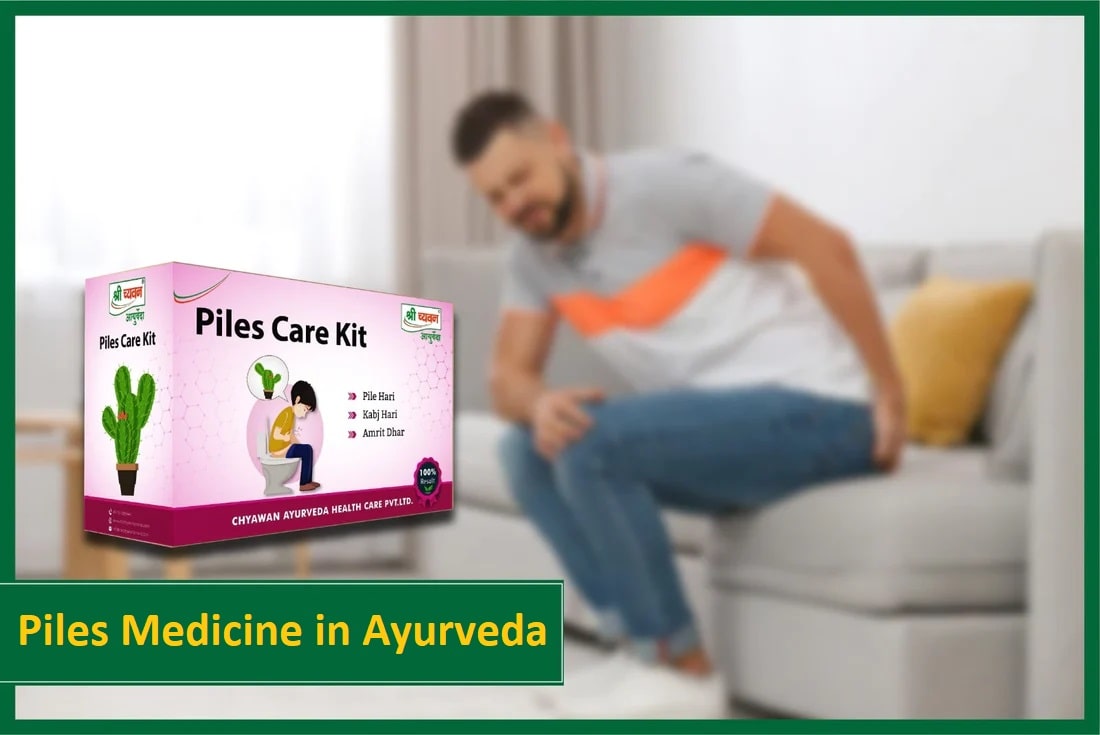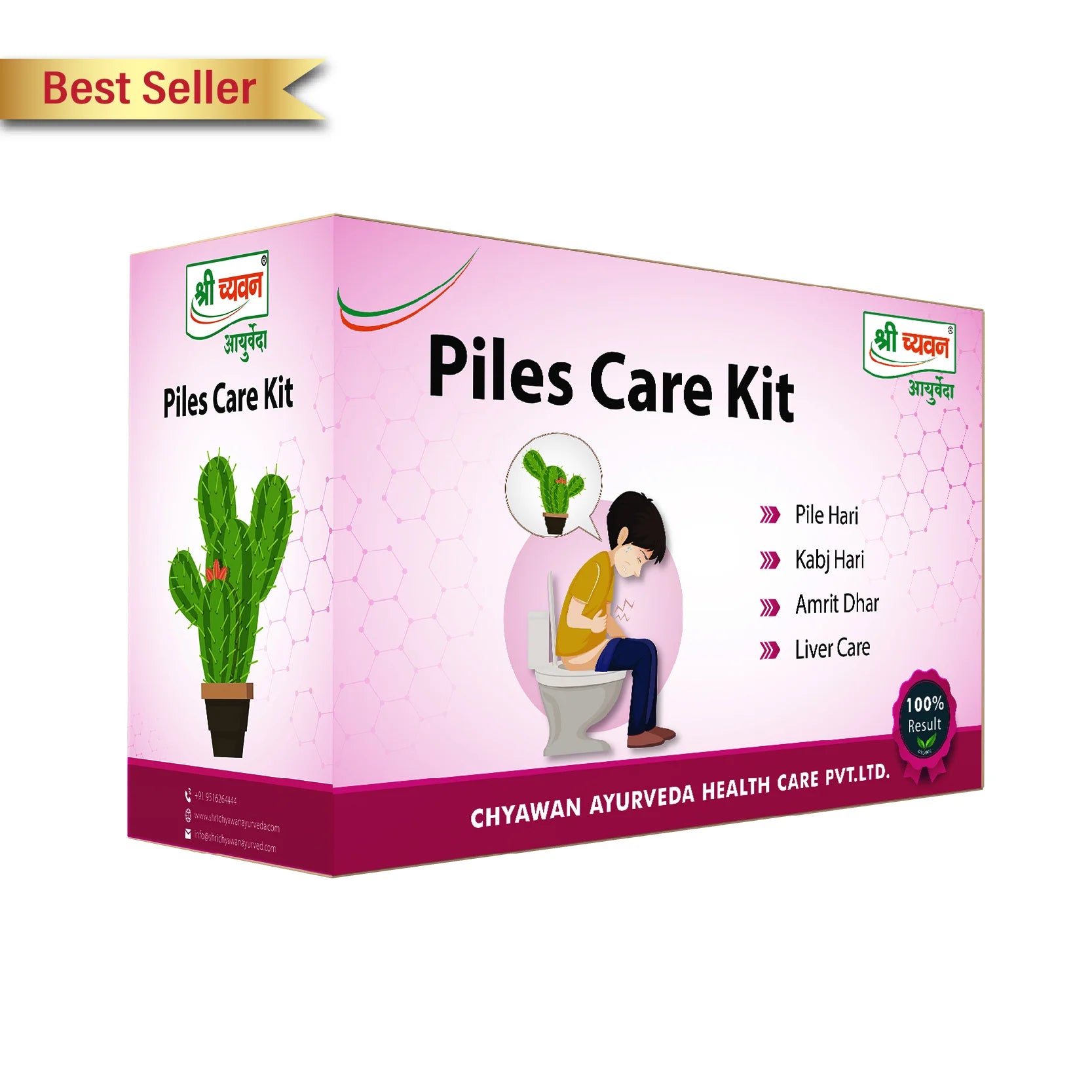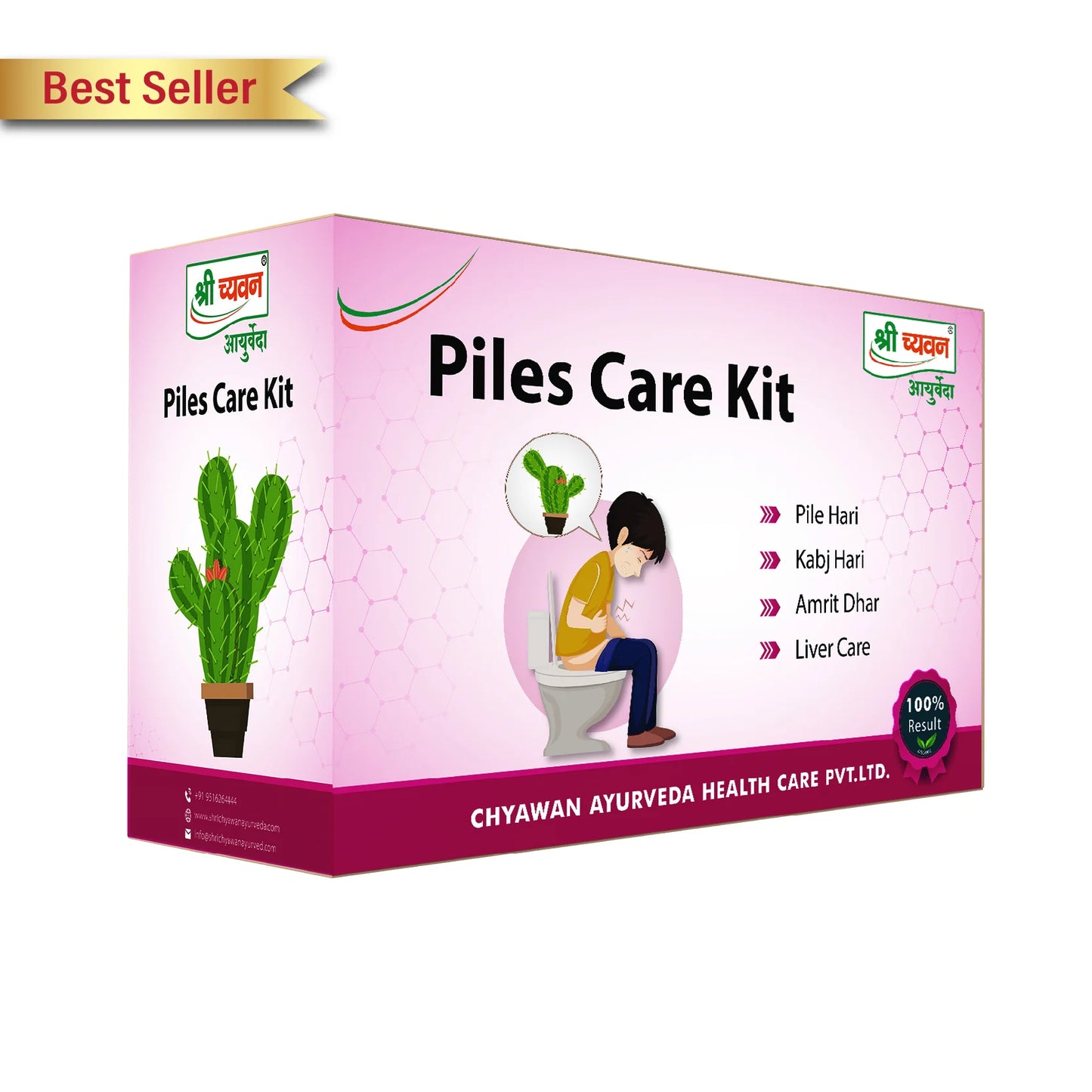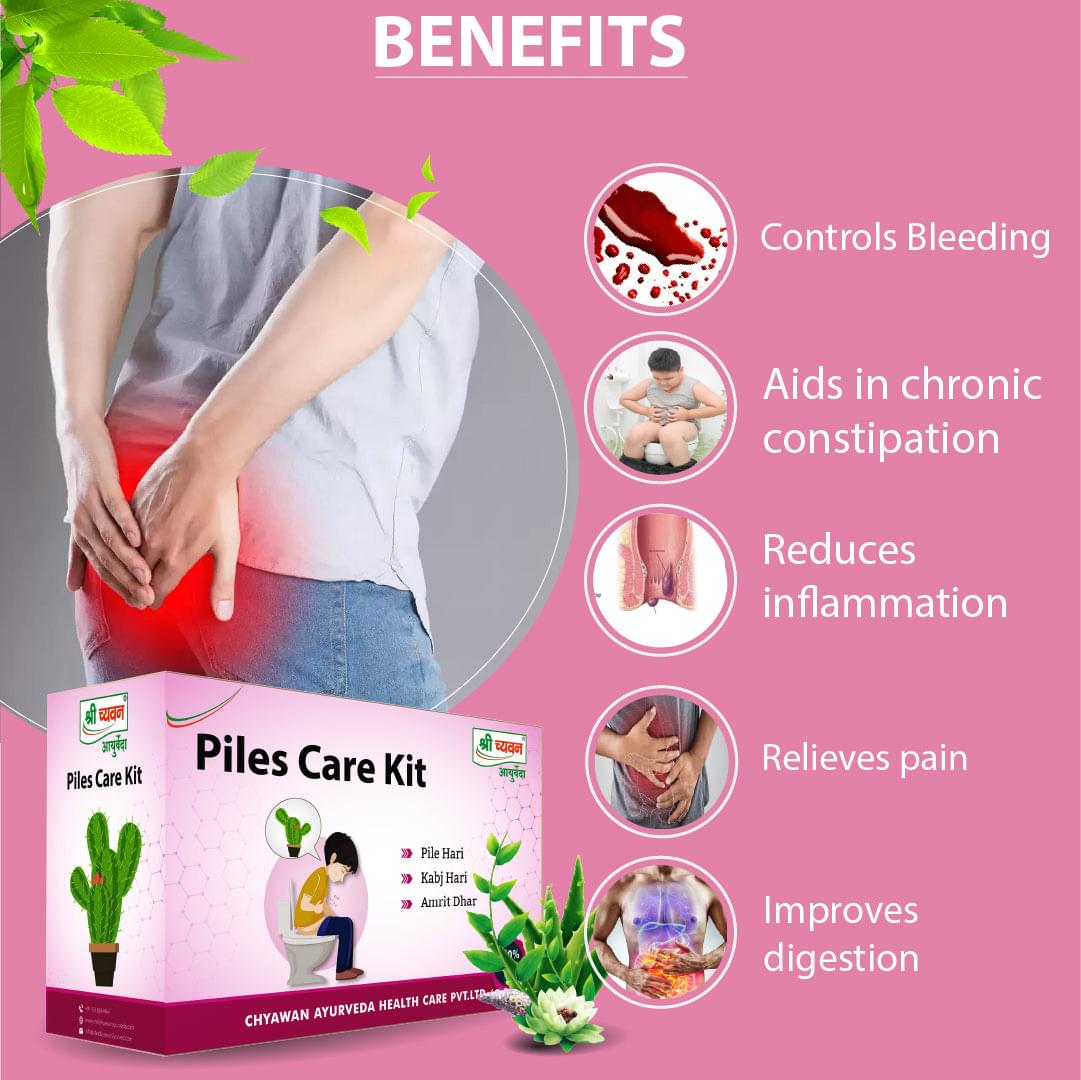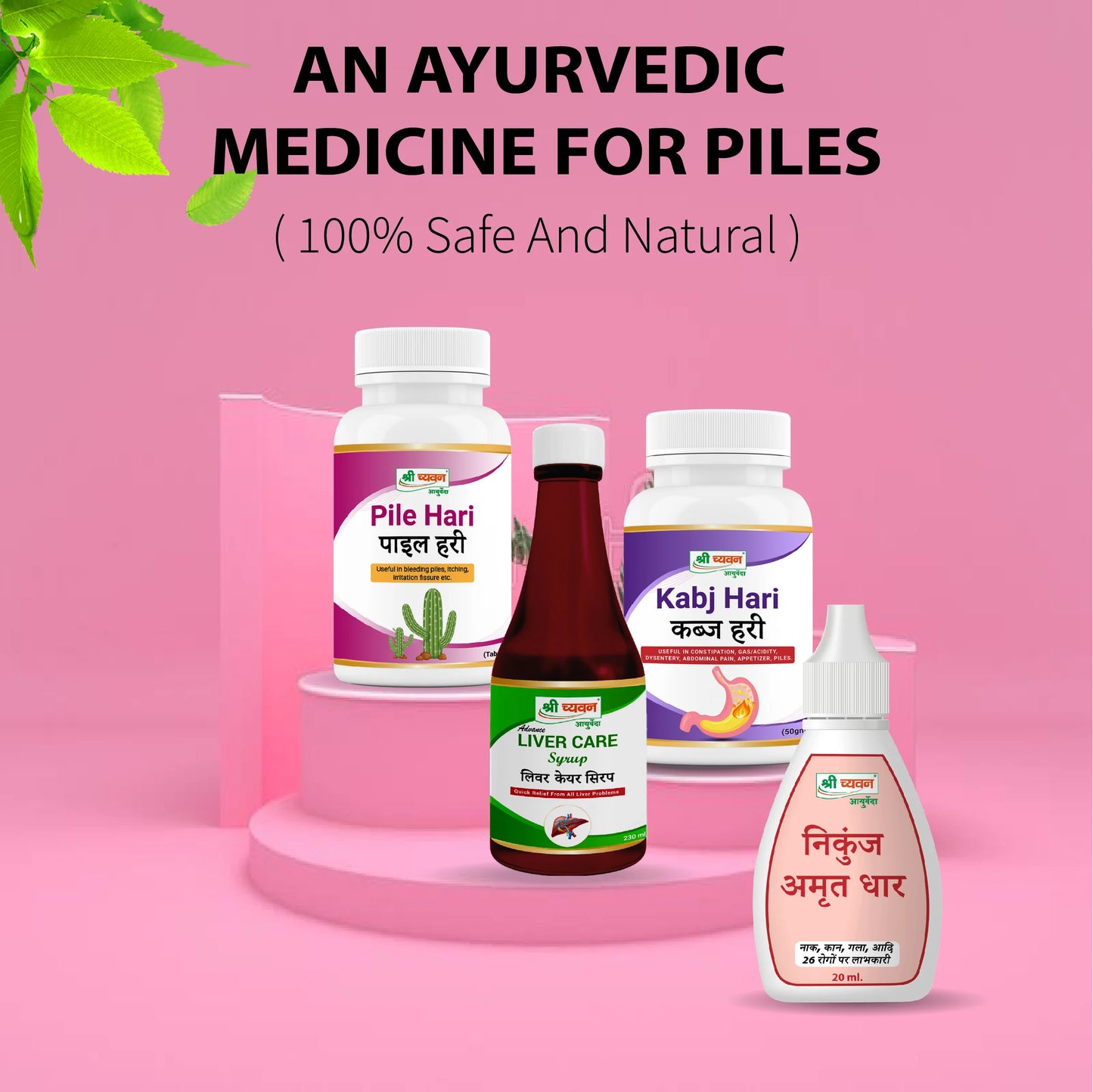In Ayurveda, Piles, also known as Arshas, is considered a common disorder affecting the anal region and is caused by the aggravation of the Vata dosha. The Vata dosha governs the movements and functions of the body, and its imbalance leads to dryness, hardening, and constriction of the blood vessels in the rectum and anus. This results in the formation of swollen and inflamed haemorrhoids, leading to discomfort and pain during bowel movements.
Piles or Haemorrhoids are classified into two main types: the dry (Vataj) type and the bleeding (Pittaj) type. The Vataj type is characterized by dry and painful piles, often causing a dragging sensation in the anal region and associated with constipation. On the other hand, the Pittaj type is characterized by piles with bleeding, a burning sensation, and inflammation, and is often related to chronic diarrhoea or dysentery.
Ayurvedic treatment for piles focuses on restoring the balance of the doshas and promoting healthy bowel movements. Herbal remedies play a crucial role in managing the condition. Medicinal herbs like triphala, haritaki, neem, and aloe vera are commonly used to soften the stools, reduce inflammation, and promote healing. Additionally, dietary and lifestyle modifications are recommended, including consuming a fiber-rich diet, drinking plenty of water, avoiding spicy and fried foods, and engaging in regular exercise.
If left untreated, piles can lead to complications such as chronic bleeding, anaemia, anal fistula, or fissures. Therefore, seeking early Ayurvedic intervention can effectively manage the condition and prevent further complications. Consulting a qualified Ayurvedic practitioner is essential to receive personalized treatment based on an individual's body constitution, severity of symptoms, and overall health condition.
What are the main symptoms of Piles?
The main symptoms of piles include itching, pain, and bleeding during or after passing stools. According to Ayurveda, there are two types of piles - dry (Vataj) and bleeding (Pittaj). In the Vataj type, the piles are dry and cause severe pain, while in the Pittaj type, there is bleeding along with burning sensation and inflammation.
Piles can be caused by various factors including:
- A sedentary lifestyle
- Improper diet
- Chronic constipation and
- Straining during bowel movements.
How can you treat Piles through Ayurveda?
Shri Chyawan Ayurveda has carefully best piles ayurvedic medicine - Piles Care Kit for natural treatment of Haemorrhoids/ Piles. All our products are prepared using best quality herbs and strictly follow the principals of Ayurveda. All our products are 100% Pure, Natural and Safe to be used and do not cause any side-effects.
The Piles Care Kit consists of:
- Pile Hari Vati: It is by far the best piles tablet which helps to heal inflammations and soothe pain and discomfort. It also has laxative properties that induce peristaltic movements, thus making the process of evacuating of bowels pain-free.
Ingredients: It consists of- Ambahaladar, Kalijiri, Rasot, Kali mirch, Har, Methatis, Kaharvapisti, Motipisti, Amla, Methi, Variyali, Bolbaddhras, Kaharvapisti.
How to use: One tablet every day in the morning and evening, post breakfast and snacks respectively.
- Kabj Hari Churn: This helps in a lot of stomach related issues like gas, constipation and abdominal pain.
Ingredients: It consists of Harde, Sonth, Mulethi, Baheda, Hing, Variyali, Amaltas, Black Salt, Blackpiper, Amla.
How to use: Mix 1-2gm of this churn with half cup of water, consume every day before going to bed.
- Nikunj Amrit Dhar: It helps to soothe the burning or itching sensation near the anal or the rectum area.
Ingredients: It consists of Sat Ajwain, Sat Pudina, Kapoor, essential oils and clove oil.
How to use: Take 4-5 drops on a cotton ball and apply on the affected area twice a day.
4. Liver Care Syrup: Shri Chyawan Ayurveda's Liver Care Syrup is formulated to cleanse your liver and support digestion process. It also helps to strengthen the overall functioning of the liver.
Ingredients: It consists of Chitrakmul, Amla, Harde, Baheda, Bel Patra, Dhana, Aloe vera, Ajwain, Punarnava, Giloy Satva, Neem Chal, Tulsi.
How to use: Consume 1-2 teaspoonful of Liver Care Plus Syrup, thrice a day or as suggested by your physician.
What are the best foods suitable for Piles?
- Fiber-rich fruits and vegetables: Fruits and vegetables like apples, pears, bananas, broccoli, carrots, and leafy greens are rich in dietary fiber. Fiber adds bulk to the stool, making it easier to pass through the intestines and reducing the strain on the anal region during bowel movements.
- Whole grains: Foods like brown rice, whole wheat, oats, and quinoa are excellent sources of fiber. They aid in preventing constipation and maintaining regular bowel movements, reducing the risk of aggravating existing piles.
- Legumes: Lentils, beans, chickpeas, and other legumes are high in fiber and promote healthy digestion. They help in softening the stool and preventing straining during bowel movements.
- Psyllium husk: Psyllium is a soluble fibre derived from the husks of the Plantago ovata seeds. It is often used as a supplement or added to foods to increase fibre intake and improve bowel movements.
- Yogurt: Probiotic-rich yogurt contains beneficial bacteria that aid in maintaining a healthy gut and promoting smooth digestion. This can help prevent digestive issues that may worsen piles.
- Prunes: Prunes are natural laxatives and can help soften the stool, making it easier to pass. They are effective in relieving constipation, which is a common trigger for piles.
- Flaxseeds: Flaxseeds are a good source of both soluble and insoluble fiber. They can help soften the stool and reduce inflammation in the digestive tract.
- Aloe vera juice: Aloe vera has anti-inflammatory properties that can soothe the inflamed anal area. Drinking aloe vera juice can also improve bowel movements.
- Ginger: Ginger has anti-inflammatory and digestive benefits. It can aid in reducing swelling and discomfort associated with piles and improves overall digestion.
- Plenty of water: Staying hydrated is crucial for softening the stool and preventing constipation. Drinking an adequate amount of water throughout the day ensures smooth bowel movements.
Ayurvedic treatments for piles focus on correcting the underlying imbalances in the body's doshas (Vata, Pitta, and Kapha). If left untreated, piles can lead to complications such as chronic bleeding, anaemia, and anal fissures. Therefore, early diagnosis and Ayurvedic intervention can effectively manage the condition and prevent further side-effects.

